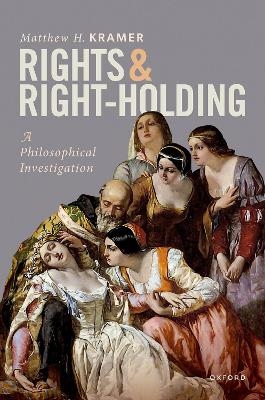
Rights and Right-Holding
A Philosophical Investigation
Seiten
2024
Oxford University Press (Verlag)
978-0-19-889122-2 (ISBN)
Oxford University Press (Verlag)
978-0-19-889122-2 (ISBN)
Rights and Right-Holding presents a rigorous philosophical investigation of the two phenomena mentioned in its title. The book engages with a number of key topics, including the Hohfeldian analysis of legal and moral positions and the longstanding debates between the Interest Theory of right-holding and the Will Theory of right-holding.
Building on many years of scholarship, Matthew H. Kramer sets out his definitive philosophical investigation of rights and rights-holding with this monograph, as he sometimes revisits and modifies his previous positions. Beginning with the analytical schema propounded by the American legal theorist Wesley Hohfeld, the book provides a defence of the proposition that every claim-right with a certain content is correlative to at least one duty with the same content and that every duty with a certain content is correlative to at least one claim-right with the same content. The volume then addresses the longstanding debates over the nature of right-holding, with a sustained defense of the Interest Theory and with some innovative critiques of the Will Theory. Finally, it considers the ethical and analytical questions involved in determining who can hold claim-rights at all. It argues that the beings capable of holding claim-rights include not only human adults of sound mind but also all other living human beings, many dead people, and all future generations of people, along with most non-human animals.
Addressing some major topics within moral, legal, and political philosophy,Rights and Right-Holding: A Philosophical Investigation will be a key work for philosophers and academic lawyers alike.
Building on many years of scholarship, Matthew H. Kramer sets out his definitive philosophical investigation of rights and rights-holding with this monograph, as he sometimes revisits and modifies his previous positions. Beginning with the analytical schema propounded by the American legal theorist Wesley Hohfeld, the book provides a defence of the proposition that every claim-right with a certain content is correlative to at least one duty with the same content and that every duty with a certain content is correlative to at least one claim-right with the same content. The volume then addresses the longstanding debates over the nature of right-holding, with a sustained defense of the Interest Theory and with some innovative critiques of the Will Theory. Finally, it considers the ethical and analytical questions involved in determining who can hold claim-rights at all. It argues that the beings capable of holding claim-rights include not only human adults of sound mind but also all other living human beings, many dead people, and all future generations of people, along with most non-human animals.
Addressing some major topics within moral, legal, and political philosophy,Rights and Right-Holding: A Philosophical Investigation will be a key work for philosophers and academic lawyers alike.
Matthew H. Kramer is Professor of Legal & Political Philosophy at the University of Cambridge and is a Fellow of Churchill College, Cambridge. He is the Director of the Cambridge Forum for Legal & Political Philosophy, and he has been a Fellow of the British Academy since 2014. His work covers numerous areas of political, moral, and legal philosophy. He is the author of nineteen books (three of them co-authored), and he is the co-editor of four additional books.
| Erscheinungsdatum | 22.08.2024 |
|---|---|
| Verlagsort | Oxford |
| Sprache | englisch |
| Maße | 160 x 241 mm |
| Gewicht | 764 g |
| Themenwelt | Geisteswissenschaften ► Philosophie ► Ethik |
| Recht / Steuern ► Allgemeines / Lexika | |
| Recht / Steuern ► EU / Internationales Recht | |
| ISBN-10 | 0-19-889122-9 / 0198891229 |
| ISBN-13 | 978-0-19-889122-2 / 9780198891222 |
| Zustand | Neuware |
| Informationen gemäß Produktsicherheitsverordnung (GPSR) | |
| Haben Sie eine Frage zum Produkt? |
Mehr entdecken
aus dem Bereich
aus dem Bereich


